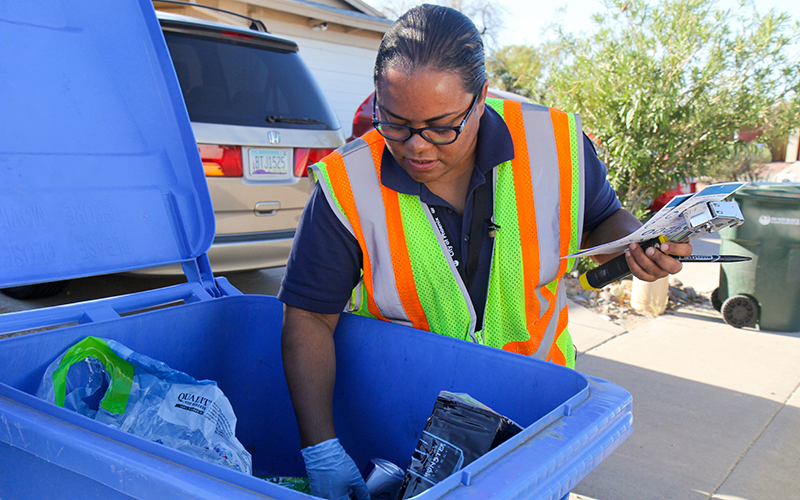
If Phoenix’s solid trash rates do not increase, cuts will need to be made, according to the city’s Public Works Department. (Photo by Stephanie Morse/ Cronkite News)
PHOENIX — The city will be talking more about trash over the next several weeks. That’s because the city’s Public Works Department says if solid waste rates are not increased, cuts must be made.
For 10 years, the solid waste rate has been $26.80 a month.
“What you could purchase in services 10 years ago for $26.80 would require $32.07 in today’s dollars just to cover for the cost of inflation,” assistant public works director Joe Giudice told a City Council policy session this week.
Over the past decade, budget director Jeff Barton, said employee costs have increased: “The personal services costs have gone from about $45 million a year to $55 million a year.”
The population has increased, and so has the amount of trash. The Public Works Department is like the Aviation Department in that it’s supposed to cover expenses through its fees. Because the department didn’t raise rates over the past decade, it came up with money in other ways.
The department pulled about $20 million from its reserve fund, deferred such capital investments as buying new vehicles and counted on recycling revenues, which recently have dried up.
Phoenix used to be able to count on $8 million to $12 million a year by selling recyclable materials to China, but China last year pretty much banned all materials. Phoenix expects little to no revenue from selling recyclables in the future.
The Public Works Department presented four rate hike options to City Council members. Those hikes range from a $6.40 a month to maintain current service levels to $4.75 a month. Some of the options included cuts to the city’s recycling program, which generated concern among recycling advocates who spoke during public comment
Councilman Sal DiCiccio told them he and other council members support recycling but said trash isn’t the issue.
“These things always get sold as a recycling type of plan, but it’s really not,” he said. “This is not a debate about recycling, this is really a debate about pensions and internal costs, and whether the city of Phoenix can manage their own internal costs.”
Mayor Kate Gallego disagreed.
“It’s important to understand that the additional expenditures related to recycling, particularly lost revenue from China, is larger than the pension contribution,” she said. “This is absolutely about recycling. Do we want to be the largest city in the country without recycling?”
The department’s pension costs have gone from roughly $5 million a year to about $10 million, according to Barton. The drop in recycling revenue went from a high of $12 million eight years ago to an estimated $3.5 million.
The City Council requested 10 community meetings be scheduled to gather public input before it takes action, which can happen no earlier than Jan. 29. By city code, Phoenix is not allowed to provide solid waste services to businesses or multifamily complexes. The city has about 400,000 residential customers.
This story is part of Elemental: Covering Sustainability, a new multimedia collaboration between Cronkite News, Arizona PBS, KJZZ, KPCC, Rocky Mountain PBS and PBS SoCal.